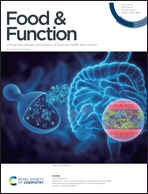Transcriptomics integrated with metabolomics reveals the ameliorating effect of mussel-derived plasmalogens on high-fat diet-induced hyperlipidemia in zebrafish†
Abstract
Plasmalogens (Pls), a special group of phospholipids, are effective in ameliorating neurodegenerative disease. In the present study, the metabolic effects of seafood-derived Pls on high fat diet (HFD)-induced hyperlipidemia in zebrafish were evaluated, and the underlying mechanisms of dietary Pls against hyperlipidemia were explored through integrated analyses of hepatic transcriptomics and metabolomics. The results demonstrated that Pls supplementation could effectively alleviate HFD-induced obesity symptoms, such as body weight gain, and decrease total hepatic cholesterol and triglyceride levels. Integrated hepatic transcriptome and metabolome data suggested that Pls mainly altered lipid metabolism pathways (FA metabolism, primary bile acid biosynthesis, steroid hormone biosynthesis, and glycerolipid and glycerophospholipid metabolism) and the TCA cycle, induced the overexpression of anti-oxidation enzymes (Cat, Gpx4, Sod3a and Xdh), reduced disease biomarkers (such as glutarylcarnitine, gamma-glutamyltyrosine, and 11-prostaglandin f2) and gut microbiota-derived metabolites, and increased (±)12(13)-diHOME, EPA, lysoPC and PC levels. Moreover, 5 abnormally regulated metabolites were identified as potential biomarkers associated with hyperlipidemia according to the metabolomics results and suggested the involvement of gut microbiota in the anti-hyperlipidemic effects of Pls. Collectively, these findings suggest that the protective role of Pls is mainly associated with the promotion of unsaturated fatty acid biosynthesis and cholesterol efflux, lipid and phospholipid PUFA remodeling, and anti-oxidation and anti-inflammatory capabilities. This study provides valuable information for reasonably explaining the beneficial effects of seafood-derived Pls in alleviating hyperlipidemia and thus may contribute to the development and application of Pls as functional foods or dietary supplements to protect against obesity and hyperlipidemia.



 Please wait while we load your content...
Please wait while we load your content...